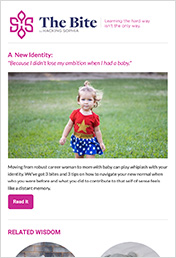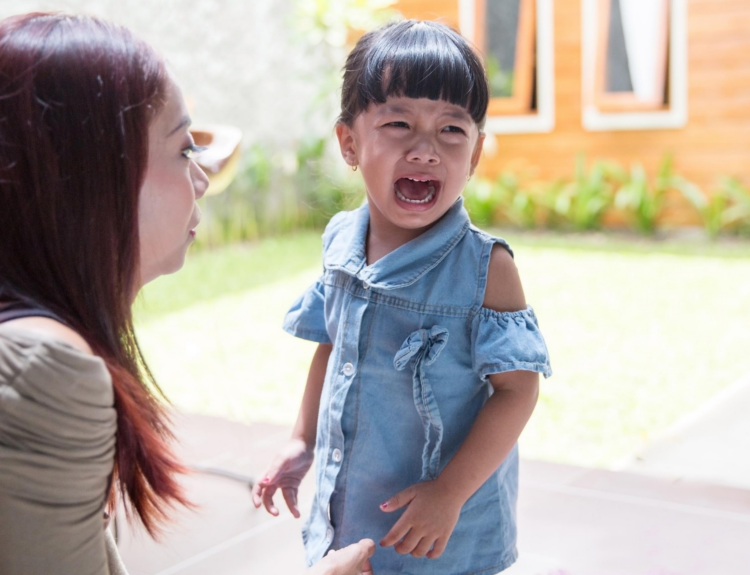It’s mid-August. Back-to-school is upon us. And with it, all of the anxieties that come with preparing your kids, who have been glued to your side for nearly six months, to begin a new school routine with new classmates, new teachers, and new protocols in an unchartered world. This might be the mother of all transitions. That’s why we tapped Dr. Becky Kennedy, clinical psychologist and mom of three, who has an impeccable way of providing perspectives and tools that make parenting feel *almost* easy. She shared her bite-sized wisdom with us, which includes her signature scripts so you can start preparing your child for what’s to come.
Every kid should know the word Coronavirus, they should understand what we’ve been doing by staying home, why the transition is coming, what it will feel like, and what we’ll do to feel good through it. Dr. Becky Kennedy, PhD
What To Do (Bites)
-
Give it To Them Straight – They Already Know Something’s Up
One thing parents underestimate the most is that we have to explain tricky stuff to our kids. We may think we are protecting our kids by not talking about things, but here’s the thing: information doesn’t scare kids. It’s the lack of information that leaves them feeling alone and in the dark, which as we know – is where they’re most afraid.
Kids are evolutionarily predisposed to sense changes in their environment – it goes back to the early days of survival, where hearing rustling in a bush might send them into high alert until a parent says, “don’t worry it’s not a bear, it’s just a squirrel.” Today, they register changes similarly: “I haven’t been out, my parents are home all the time, I can’t see my grandma.” These changes can produce threatening feelings that accumulate and feel terrifying in their body until an adult can explain it. Once they have an experience and are helped to understand why it’s happened – that’s healing. Here’s what you can say:
“There’s this jumpy germ called the Coronavirus. One thing we know is it jumps from person to person – it’s why people have been in their homes for so long. Staying in our homes has made it safer for us to go out now. There are some interesting things that people are doing now – they wear masks to be sure they’re safe from any leftover germs. They’ll be taking your temperature when you go to school- that’s a little weird! They’re doing that to make sure none of the jumpy germs have gotten into any of the kids’ bodies.”
-
As with any transition, “Emotional Vaccination” is Key
Beyond giving a heads up about new protocols, you can also ease the back-to-school transition through “Emotional Vaccination” – preparing your child for the feelings they may have around it. Most parents actively avoid this because they “don’t want to give their child any ideas or put feelings inside them.”
Guess what? You can’t put a feeling inside someone else. But you can instil coping, resilience and a sense of safety by letting them know it’s okay for them to be upset. For example, “Drop-off is going to feel tricky this year because it’s new. I understand that. It’s okay if you cry. And it’s okay if you don’t cry. I know we’re both going to be safe. We’ll do our goodbye ritual, (see tip 2) then I’ll see you at pickup.”
When you tell a kid it’s okay that they may feel upset and they’re safe, you’re giving them the message that they have the ability to get through something hard even if there are tears at the moment of goodbye.
-
Prepare for the Unknown – Let Them Know Things May Change
These days, things change in a moment. School may start then stop then start again. It can feel difficult to have all the answers and properly prepare our kids. What you can do is give kids a list of the things we know, and the things we don’t know: “You have so many good questions and I don’t know all the answers. For you and me too, it’s hard not to know things. Here’s what we do know – this year’s going to be full of changes. Moments that feel good and some that may feel not so good. This is the schedule for now. Things might change. We might get into a routine then need to get into a new one. Through it all, I will listen, we will talk, we’ll get through it together. We are strong and safe.”
In saying this, you’re grounding your kid in your strength as a parent, the certainty of your family unit and resilience, which will help them cope. After all, don’t we all just want some big comforting leader in our lives to say “whatever it is, you and me, we’re going to get through this together!”
Tips
-
These conversations might feel difficult. The most underused parenting strategy is roleplaying with yourself in front of a mirror. Practice what you’re going to say so you can say it with ease and confidence. If you prefer, write it down and read it to your kids. Tell them you’re reading it because you want to get the story right. They don’t care and they won’t judge you – it’s not a job interview. Give yourself that leeway for tough conversations.
-
Keep a goodbye ritual short and sweet. Don’t give the kid too much responsibility within the ritual or it could get derailed. I suggest saying something playful like “see you later alligator,” give a hug and whisper “mommy (or daddy) always comes back.” Teachers always say kids repeat “mommy (or daddy) always comes back” like a mantra. Practice your ritual the week before. Then when you do it at school, leave and get out of there. Lingering makes it harder for everyone involved.
-
It’s really hard to be a parent right now. We’ve been operating under an assumption that a few months from now the world will be different from the one we’re living in today. But that’s been taken away from us, and it’s hard to make decisions without it – around health, mental health, etc. The fact is, there is no right answer. The best thing we can do is remind ourselves that we’re doing the best we can with the information available at this time. In moments of uncertainty, take a breath, be kind to yourself, say to yourself “I am enough, I’m a good parent,” and lean on supportive friends or family members.
MY CHOICES. MY WISDOM.
What does your work do for you that you’d miss if you didn’t have it?
“To me my work gives me something concrete that feels forward-moving. As a mom, I do my best to tolerate so much mess and difficulty in the short run, knowing that’s where resilience is built. My work gives me an avenue where I can put a thought on paper, or see this many clients. It’s more linear, whereas parenting kids of different temperaments is not linear. It allows me to tolerate more nonlinearity and messiness with my kids.
My work also helps separate kids’ behavior and achievements from my worth as a mom or person. Work provides me this other source of identity, value and points of interest which allow me more distance with my kids – I’m less likely to be compelled to feel over invested in their latest math score or whether they made the A-team in soccer.”
There’s a lot of mom-judging. What’s one thing that might be controversial that you’re unapologetic about?
“At night when we say goodnight or if we’re going out for dinner, I explicitly say, ‘I love being your mom. I also love being a wife. Those are two entirely different things. The reason mommy and daddy go out with each other and with our friends is because it’s important for us to be wife and husband and not just mommy and daddy.’ Those wife and husband roles can get lost in parenting. When I say goodbye and they cry, I still validate that they’re upset that we’re leaving. But I think it’s really important to explicitly model how to care for yourselves when you’re in other relationships. It’s good for them in their life going forward.”
Biggest piece of advice or wisdom for working moms?
“I think it’s critical for working moms to be aware of their own needs and what feels good for them and hold that as separate from recognizing their kids’ feelings and needs. In your mind you may know it’s important for you to work and continue in your job. Your kids may wish you could do drop-off more. You can still be empathic with your kids about the impact your work has on them, but it doesn’t mean you should quit your job. You don’t have to have your kids’ support or approval in your decision to work. You can acknowledge the difficulty they feel. But you don’t need to convince your kids it’s a good thing you’re working. If you can separate that out and empathize with both, it can be liberating.”
Most medal-worthy moment?
“There are plenty of ugly moments where there is hitting, screaming, name-calling. When my kids are acting out, and I can put a limit on the behavior, remove them from the situation firmly and swiftly, and not allow the moment to make me lose sight of the fact that they’re a good kid who is just having a hard time versus a bad kid, those are the medal-worthy moments.”
What do you hope your kids will say about you when they’re adults?
“My mom really allowed me to figure out who I am.”






